Top 10 Best Cities To Travel And Work Remotely In The World
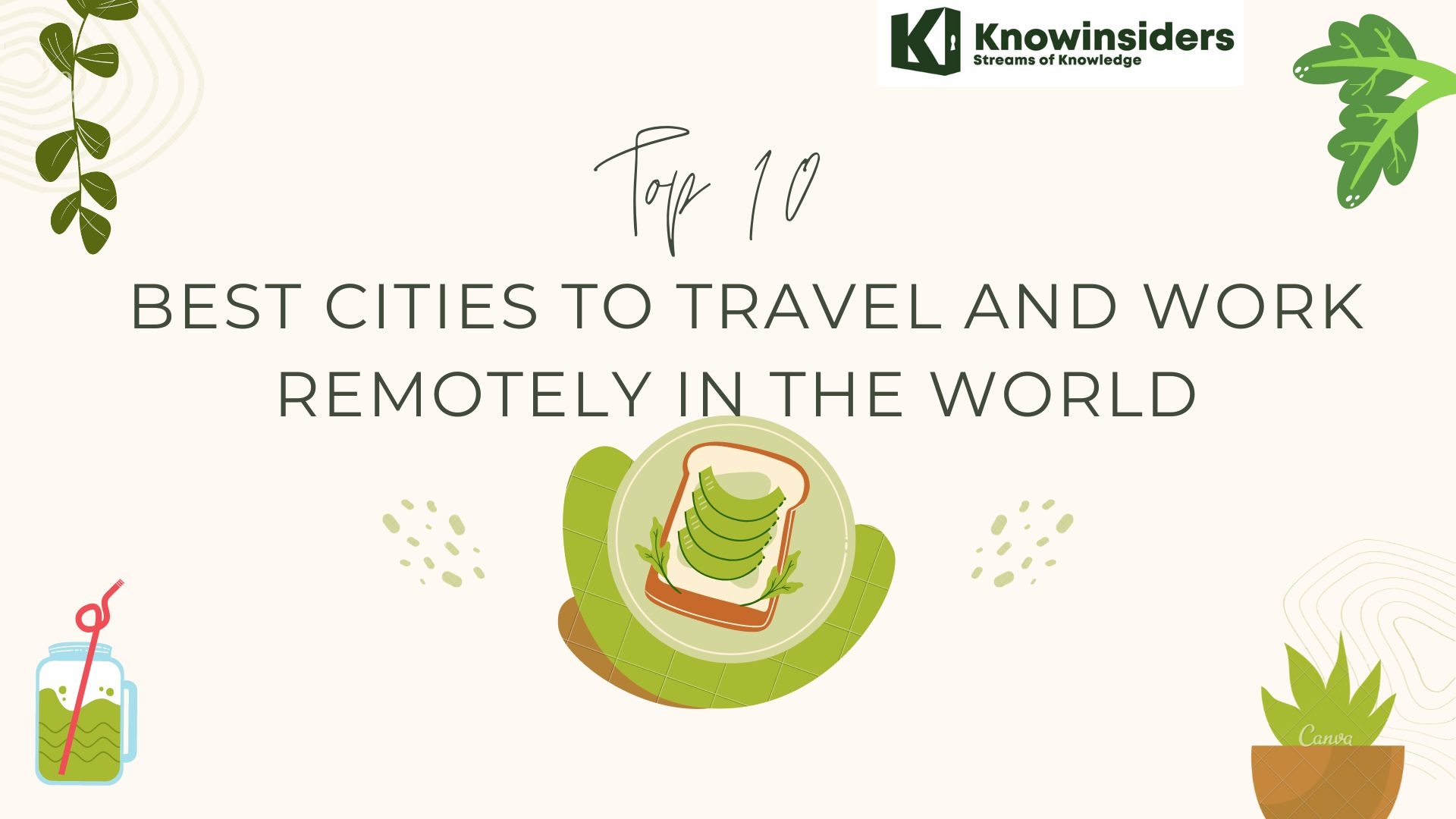 |
| Top 10 Best Cities To Travel And Work Remotely In The World |
| Table Content |
Kansas City, Missouri, was named the best city in the world to work during the day and explore after hours without having to use too much of your PTO time, according to a recent analysis from Icelandair.
Kansas City — known for its barbecue, jazz scene and for having more fountains than Rome — is home to attractions including The Nelson-Atkins Museum of Art, Kauffman Stadium, Worlds of Fun and a bustling downtown. It comes out on top of 115 global cities in the ranking, which were chosen because of their prominence in the tourist industry and availability of “slow” travel options.
Here are the 10 best cities to travel and work remotely in the world.
The Benefits of Working Remotely
Creating physical separation from a micromanaging boss is just one of many benefits that go hand-in-hand with working remotely.
Here are a few others worth mentioning:
- Take advantage of flexible working hours. Before the internet, new parents didn’t have much of a choice when it came to being with their babies during the day or holding a full-time job. Now, parents can spend more time with their children, while doing their jobs from home—no trade-off necessary. For those without kids, the freedom of flexible working hours means that you can sleep in if you’re not a morning person, or work into the night if that’s your preference. Just make sure to draw a clear line between work and your personal life!
- You can work from anywhere. The beauty of a remote working set-up is that you can literally work from anywhere: your couch, a coffee shop, poolside, or from another part of the world (as long as it has an internet connection!).
- There’s no dress code. Since you can work from anywhere, what you wear doesn’t necessarily matter, unless you have an important client meeting. And even then, as long as your top half looks professional, you’re good to go. So yes, one of the perks of working remotely is that pants are optional and pajamas are encouraged.
- You’ll inevitably learn new skills. If you’re a remote worker who’s working for themselves, as part of your transition, you’ll have to pick up new skills that aren’t necessarily part of your core expertise, such as bookkeeping, project management, and even a little legalese. And if you’re working for a company that lets you work remotely, you’ll also be learning new methods of communication and project management skills to bridge the physical gap between you and other team members.
- Save money (and the earth). For many in today’s workforce, the prospect of a daily, multi-hour commute is enough to make you countdown to Friday as soon as Monday rolls around. Time spent in your car or on public transportation can be made productive but it can’t make up for time taken away from your family. Who wouldn’t want to get that time back? Not to mention all the money spent on gas, train tickets, and so on!
Remote Working Tips for Beginners
1. Over-communicate
The key to being successful in any professional role is communication, but when it comes to remote work it is an even more important asset. Since you’re no longer a few desks down from your coworkers or your manager, it’s your job to schedule 1:1 check-in meetings with them on a weekly basis to connect on your goals, upcoming projects and daily tasks.
Make sure to advocate for yourself and clearly state the progress you’ve made in the past week, which goals you’ve surpassed and which projects you’ve led. When you’re not in the office, it can be difficult for your manager to keep your work top-of-mind, so don’t be afraid to bring important milestones up on your own.
2. Invest in reliable tech
Any remote worker will tell you that access to consistent WiFi is integral to their success, but there's more to a successful setup than an internet connection. Along with having the ability to take video calls without losing connection, you should consider what tools and tech you'll need to do your job well. For example, many remote workers invest in a great pair of noise-cancelling headphones so that they can take their work anywhere - regardless of background noise levels. Others find that wireless keyboards and mouses, or even a second screen, are integral to their efficiency.
3. Lean on your community
One of the major myths surrounding remote work is that people who don’t work in a corporate office are lonely. To make sure that you’re feeling supported and connected to the “real world”, we recommend becoming a part of a remote community - either virtually or in-person at a local coworking space or collective. We’ve found that being surrounded by others who are successfully working remotely inspires beginners to stay the course and remain productive while embracing location flexibility.
4. Consider your workspace
Set yourself up for success in a place where you can focus on the tasks at hand. Whether this means you find a great coworking space near you, stake out a local coffee shop or create a designated spot for work at home, make sure that you feel motivated by your environment and ready to tackle whatever comes your way.
5. Figure out your working style
At the start of your remote work journey, it’s a great idea to figure out the environment that you need to work successfully. For example, do you like being surrounded by white noise? A café may be the best choice for you. Work well in silence? It might be time to invest in some noise-cancelling headphones. Other things to consider are whether you’re more productive in the morning or in the evening and whether you’re motivated by taking small breaks throughout the day or a longer midday respite. This is the beauty of remote work - getting to work during your best hours, whatever they may be.
What Are The 10 Best Cities To Travel And Work Remotely In The World?
1. Kansas City, United States
 |
| Photo: Hotels.com |
Kansas may be at the heart of what East Coast residents and West Coast dwellers call “flyover country,” but the Sunflower State boasts an eclectic mix of culture, history, and little oddities that are sure to delight residents and visitors alike. Famous as the setting of the 1939 film “The Wizard of Oz” and home to the second-winningest college basketball team at Kansas University (Rock Chalk, Jayhawk!), Kansas is a surprising cultural icon among states that seemingly struggle to showcase an identity.
Stretching 410 miles from east to west, Kansas’s eastern border is reminiscent of the Midwest in aesthetic while the western portion features sharp changes in the terrain that are characteristic of the American West. Still, the charismatic and chatty nature of Kansans remains no matter where you travel. They may suggest options such as seeing the world’s largest ball of twine in Cawker City, visiting the original Pizza Hut location in Wichita, or checking out the strange rock formations at Little Jerusalem Badlands State Park. Regardless of what you see or do, this plains state is more than just a giant wheat field; it’s an unexpected thrill for people willing to make the journey.
Remote Work Incentives in Kansas
To attract talent in both remote and traditional work arrangements, Kansas offers a number of programs. In this regard, the Sunflower State has become a beacon of progressive work policies. By providing affordable living options and giving people money to set up their small business, Kansas may find a new crop of remote workers in the near future.
The capital city of Topeka is offering between $10,000 and $15,000 to workers who purchase or rent a home and work in the city for a year. Lincoln, a town of about 1,200 in north-central Kansas, is offering free plots of land between 12,000- and 36,000-square feet to those interested in building homes in the largely agricultural community. For the aspiring entrepreneur or remote business owner, these two incentives are ideal for setting up roots in the low-cost areas throughout Kansas.
New residents to Cottonwood Falls, a village of 900 people in east-central Kansas, is one of 77 towns in Kansas that waive your state income tax for 5 years, as well as offer up to $15,000 in student loan payments, giving remote workers and recent graduates two additional reasons to relocate to Kansas.
Kansas also promotes small businesses with a number of tax credits. Companies that relocate to Kansas can earn tax incentives, as well as companies that offer above-average wages to employees or training programs.
2. Vienna, Austria
- Vienna has a well-developed economy and although most jobs are found in the service sector, the marginal sector still plays an important part in terms of turnover.
- The city has reacted accordingly to its international appeal by founding an Expat Center which serves as a contact point for expats who are looking for advice and support.
- Several factors determine which permit you require and it is advised you familiarize yourself with the different permits before you move to Austria’s capital.
- Every employee receives mandatory health insurance, insurance against work-related accidents and illnesses, and pays into a pension fund from the day of their first paycheck.
- Although most businessmen make use German, you will most likely come across the Wienerisch dialect, which is unique yet widely popular in the city.
Vienna, which constitutes both a city and its own federal state, contributes some 25% of Austria’s gross national product. It is also in the top 10 of the wealthiest regions in Europe. As is typical for the Western industrialized world today, most jobs in Vienna are found in the service sector. Roughly one third of these employees earn a living in trade, real estate, leasing and business services. Overall, the majority of revenue generated in Vienna (approximately 85%) is made within the tertiary sector.
But working in Vienna does not automatically imply leaving nature behind. While agriculture is a rather marginal sector in terms of turnover, its importance to the city is fairly large. More than 650 agricultural businesses are currently based within Vienna’s city limits. The agricultural sector was allotted about 3,000ha of Vienna’s municipal area. The most common crops are grain, potatoes and other vegetables. The sprawling vineyards on the outskirts of the city show that the city has a long tradition in the wine business.
The overall economic trend of the past few years has shown considerable annual growth. While Vienna has also suffered from the global financial crisis, the consequences have been comparably mild. The city still offers career opportunities to expats in virtually any line of work and business. This makes working in Vienna a prestigious, lucrative and sensible decision. If you are thinking of making the step abroad to Austria’s capital, you can find assistance at one of the many relocation providers located in the city. These consulting businesses offer valuable help and are often hired by larger companies. The city itself is also well aware of its international appeal, and it has reacted accordingly. A newly founded center for expats serves as a contact point and offers advice on different aspects of expat life.
Generally speaking, finding a job will come the easiest if you are highly qualified or have an employment contract before coming to Austria. If you do not already have a contract, Austria provides another option: the country offers special six-month job-seeker visas for people who’d like to actively look for jobs in the country. This also gives you a chance to familiarize yourself with your future city of residence.
After the application process of about two months, you are free to explore the Viennese job market. If your job hunt has been successful, please consider that you now need to apply for a regular work permit.
Highly skilled professionals should apply for a Red-White-Red Card or an EU Blue card. These two include both a work permit and a settlement permit. However, the latter is of limited duration. Acquiring one of these will probably involve the least amount of paperwork and provide the quickest start to working in Vienna. Despite the rather complicated regulations, your future employer should help you make the paperwork as easy as possible.
However, there are many exceptions and special regulations you might wish to familiarize yourself with. It is highly recommended to visit the pages on migration affairs of the Austrian Federal Government to find out which option is right for you.
3. Wellington, New Zealand
 |
| Photo: Getty Images |
Close to half a million people are currently living in the greater Wellington region, which includes the four cities of Porirua, Upper Hutt, Lower Hutt, and Wellington itself. Wellington is the third-largest city in New Zealand, with plenty of work opportunities that consistently draw in new residents from around the globe.
With people of so many backgrounds settling in Wellington, it is a wonderfully diverse place. Almost a third of its residents were born overseas.
The city has a deserved reputation for being very windy, but Wellington experiences all kinds of other weather conditions, too. Temperatures average around 15-20 degrees Celsius in the height of summer and 0-10 degrees Celsius in the middle of winter, with the average annual rainfall in Wellington at 1,250 millilitres. Snowfall is very rare.
The average temperatures in Wellington during summer make for a very pleasant climate, not too hot but warm enough to enjoy the beaches and parks. Weather changes quickly in the city, so always be prepared with a jacket even on a sunny day.
Many industries contribute to Wellington’s economy, making it an excellent place for a variety of workers to get jobs in New Zealand. The city houses a busy port and is home to corporate offices of many New Zealand and international companies, as well as the New Zealand government and many government organisations. The hospitality industry is strong in Wellington, which is known for great restaurants.
Tourism, arts and film have become key industries in Wellington, and the city has become a hub for creative types, who will have many work opportunities there. The city consistently has the highest salary averages in New Zealand. The national minimum wage is $17.70 per hour, with a training minimum rate of $14.60.
Places to Live in Wellington
The best places to live in Wellington depend on what any particular resident values in their community. The city contains plenty of safe suburbs, ranging from inner-city neighbourhoods to affordable areas more distant from the city centre, such as Porirua, Lower Hutt and Upper Hutt—the cheapest places to live in Wellington.
If you are planning to move to Wellington, you can expect to pay around $450-$550 per week for a small house or flat in the central city, and around $350-$450 per week for a similar dwelling located in Lower Hutt. The average residential property value for the city rose above $600,000 in 2018.
Cost of Living in Wellington
Average living costs are comparable to those of any other major city in New Zealand. For housing costs, refer to the section above. The following are benchmark common living costs:
- Two litres of milk: $3.50-$4.50
- A Big Mac combo: $11
- A cheap loaf of bread: $1-$2
- Unlimited fibre internet: $80-$100 per month, dependent on location and provider
- One litre of petrol or gas: $2.10
4. Copenhagen, Denmark
There are a lot of factors in favor of working in Copenhagen: the abundance of opportunities, the flexible working environment, and the beneficial location within Northern Europe, to name but a few. The Danish capital has become an increasingly popular destination among expats in recent years, and each year many Danes decide on working in Copenhagen as well.
Copenhagen is an attractive business location for both international companies and expats. First of all, the Øresund region is well known for providing an excellent economic infrastructure, with its airports, harbors, and its connection to road networks and railways. The Øresund Bridge, opened in 2000, added a new and convenient connection between Denmark and its neighbor Sweden.
Naturally, the fact that any destination within Northern Europe can easily be reached is not the only argument in favor of working in Copenhagen. The area benefits from a highly flexible labor force, dedicated to hard work and a healthy life-work balance. At the same time, the majority of Copenhagen’s population speaks English fluently, which also makes working in Copenhagen easier for expats unfamiliar with the Danish language.
Among the most important sectors for people working in Copenhagen are the life sciences, information and communication technologies, clean tech, as well as the creative and entertainment industry. Expats could try their chances of finding employment in one of these sectors.
Life Science and Clean Tech
With Medicon Valley, Denmark offers many opportunities to locals and expats working in Copenhagen’s life science sector. Medicon Valley is a bi-national center for life science, located partly on Zealand, centered in Copenhagen as well as Sweden’s Skåne Region. This is where international investors in the field of life science chiefly settle. After all, the area represents one of Europe’s strongest life science locations.
For expats who plan on working in Copenhagen’s life science sector, the Medicon Valley is just the right place. The collaboration between hospitals, universities, specialized services providers, and businesses is just one of the things that make for a high-class working environment. The therapeutic areas of neuroscience, cancer, metabolic diseases, allergy, and autoimmune diseases are also particularly strong here.
Many clean-tech companies, too, have decided to establish branch offices in Copenhagen. In terms of research and development in sustainability, Copenhagen is world class, and by 2025, it aspires to become the first CO2-neutral capital in the world.
The ICT Sector
Copenhagen is also among those leading the way in terms of information and communication technologies (ICT). The highly skilled workforce is one of many aspects that make Copenhagen’s ICT industry one of the most innovative in Europe. This sector in particular may offer many opportunities for expats. Copenhagen is an attractive location for international companies, and many of them might just be inclined to transfer some of their employees abroad.
Denmark’s largest IT cluster, unsurprisingly, is located in the Copenhagen area, and over 100,000 people are employed in ICT companies in Greater Copenhagen and the Øresund region. The cluster is in tight cooperation with Skåne and the Øresund IT Academy. Many international companies such as Microsoft, IBM, and Cisco have offices in the Danish capital, providing jobs for all the people working in Copenhagen-based affiliates of these companies.
Creative and Entertainment Industry
Copenhagen and the entire Øresund Region can look back on a long tradition of movie making. Carl Theodor Dreyer, Bille August, and Lars von Trier are among the directors who made the region popular. Today, the creative industries make up 7% of the Danish employment and revenue, and these production companies could be interesting for expats thinking about working in Copenhagen as well.
Another branch of this sector is the up-and-coming video game industry. More and more software developers settle in Copenhagen, representing a new branch of the entertainment industry. High technology and innovation certainly combine to make working in Copenhagen an attractive proposition.
5. Edinburgh, United Kingdom
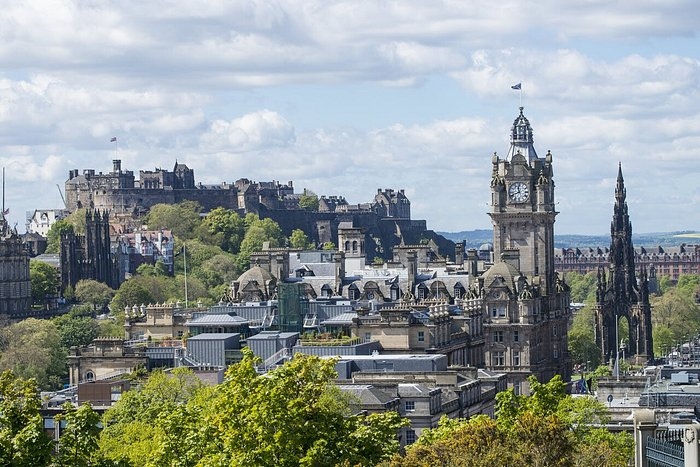 |
| Photo: Tripadvisor |
While an expensive place to live (think high taxes and living costs) you'll benefit from top-notch public services including free healthcare. Your commute will be enjoyable too, as half of those living in the capital Copenhagen cycle to work every day.
Denmark's relaxed and informal working culture is part of the reason why it's the second happiest country on Earth, according to the World Happiness Report 2022. Denmark is also ranked in the top 20 for expat living in HSBC's Expat Explorer Survey 2021. It's also the place to go if you're seeking 'hygge', the uniquely Danish concept of cosiness and togetherness.
While English is commonly spoken in business don't pass up on the chance to learn a second language. Danish language courses are widely available and having a grasp of the local lingo will help you to make friends and settle in.
Generous holiday entitlements mean you'll have plenty of time to explore tourist attractions such as Tivoli Gardens, the original LEGOLAND, the oldest operating fairground in the world, among many others.
Jobs in Denmark
The Danish labour market is dominated by the services sector followed by industry and unemployment is low at just 2.7%.
Due to its geographical location, Denmark is an important distribution point for Europe. Its top exports include pharmaceuticals and medical equipment, iron and steel, food products, textiles and clothing and electronics.
The Danish labour market famously operates on a system of 'flexicurity' meaning that employers can hire and fire at will to adjust to the needs of the market but at the same time employees are safeguarded by A-kasse (unemployment insurance fund).
Workers also enjoy excellent working conditions, thanks to a strong collaborative arrangement between unions, employers and the Danish government, and the market is dominated by small and medium-sized enterprises (SMEs). You'll feel valued in your role wherever you work in the southernmost Nordic country.
World-famous brands such as Pandora, Carlsberg, Ecco and Lego all have their roots in Denmark too.
POPULAR GRADUATE JOBS
- Mechanical engineer
- Radiographer
- IT consultant
- Primary and secondary school teachers
- Psychologist
6. Victoria, Canada
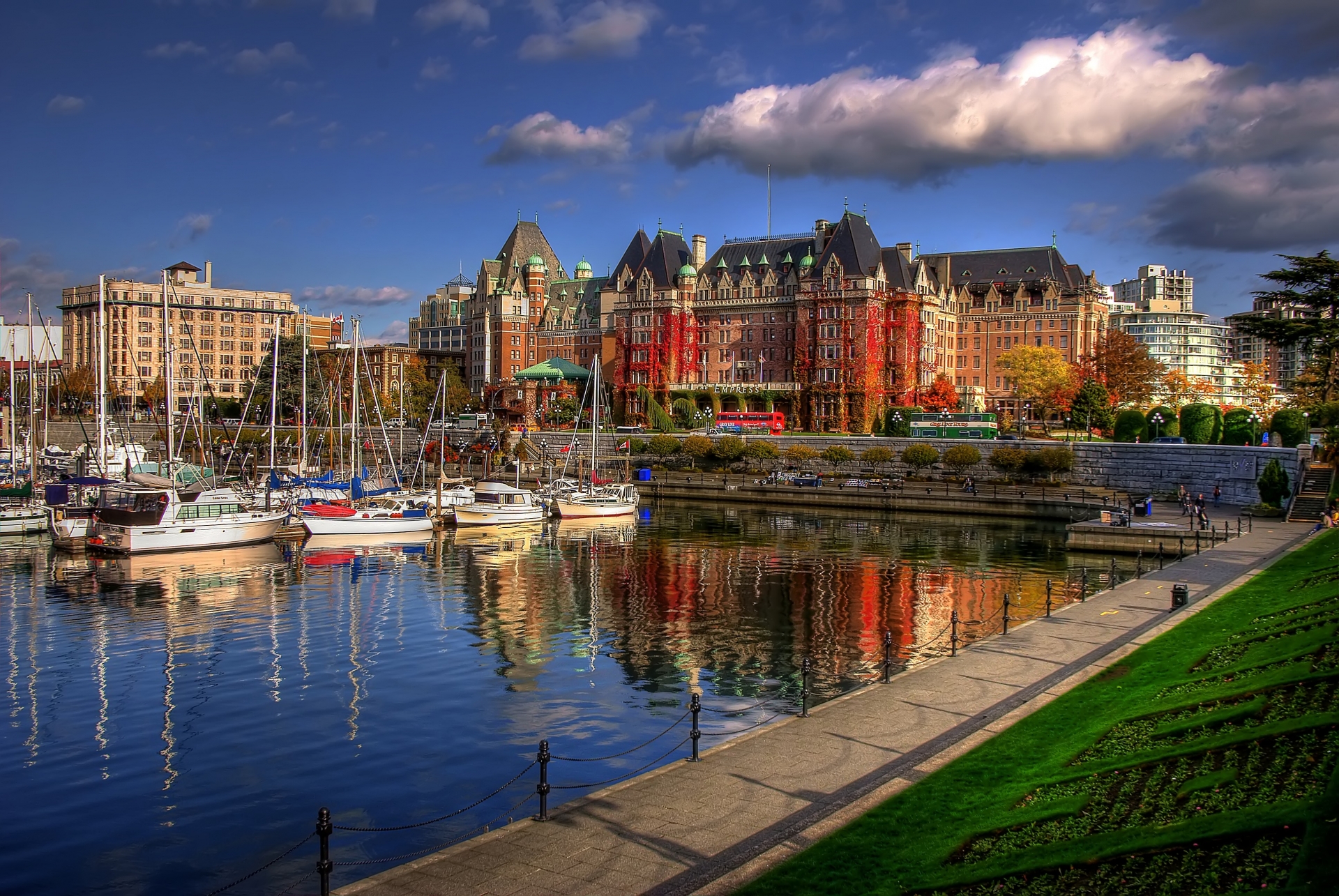 |
| Photo: Wikipedia |
Victoria offers a positive working experience, great accessibility and a wide range of job opportunities. Add in a beautiful surrounding natural environment, warm summers, mild winters and a high quality of life and it’s no surprise people from around the world choose to call Victoria home.
The Greater Victoria area is comprised of 13 municipalities located on the southern tip of Vancouver Island and 3 electoral areas that have bonded together to form the Capital Regional District. These communities are linked to support partnerships, development strategies, and governance, but each maintains its own character and governing bodies.
For those planning to move to Victoria or the Greater Victoria area, some familiarity with these communities may help you focus your home search. Greater Victoria real estate listings are numerous, and streamlining your search within certain areas will save you time and effort.
What’s different from the rest of Canada?
If you’re moving to Victoria from another province, get ready to adjust to a few minor changes. Your car insurance will now fall under ICBC (provincially managed car insurance), so you’ll need to register your car with them.
Also, hydro/gas can be a bit tricky in British Columbia. As this Huffington Post article points out, you’ll have to be proactive when it comes to setting up/paying your gas bill with Fortis. This will cause you grief making the switch, then you’ll be good to go!
One of the biggest things you’ll have to adjust to is the weather. You won’t be updating your snow pants every year or buying winter boots on the regular, because it just doesn’t get that cold in Victoria. One obvious bonus of this is not having to spend a serious amount of time warming up the car in the morning like in other provinces.
Victorians are into hockey like the rest of Canada, but they’re also quite into Rugby and Football. So if you’re an athlete, you’re in luck, there’s plenty to play/do here. Not to mention, if you’re into surfing you’re only a few hours away from Tofino, which probably has the best surfing in Canada.
What’s the economy/job market like in Victoria?
With a budding tech scene, the provincial government, constant tourism, and a lower cost of living than the mainland, Victoria is attracting top employers to the island.
The provincial government building is located in the heart of Victoria and generates a buzz around the area–attracting local businesses, students, and political staffers. Victoria recently made the top 10 cities to find a job in Canada list.
Aside from the jobs in the usual industries, if you walk down the streets of Victoria you will see an abundance of coffee shops and bars/breweries alike. Some of the best spots for coffee and beer will be right around the corner from your new home.
7. Perth, Australia
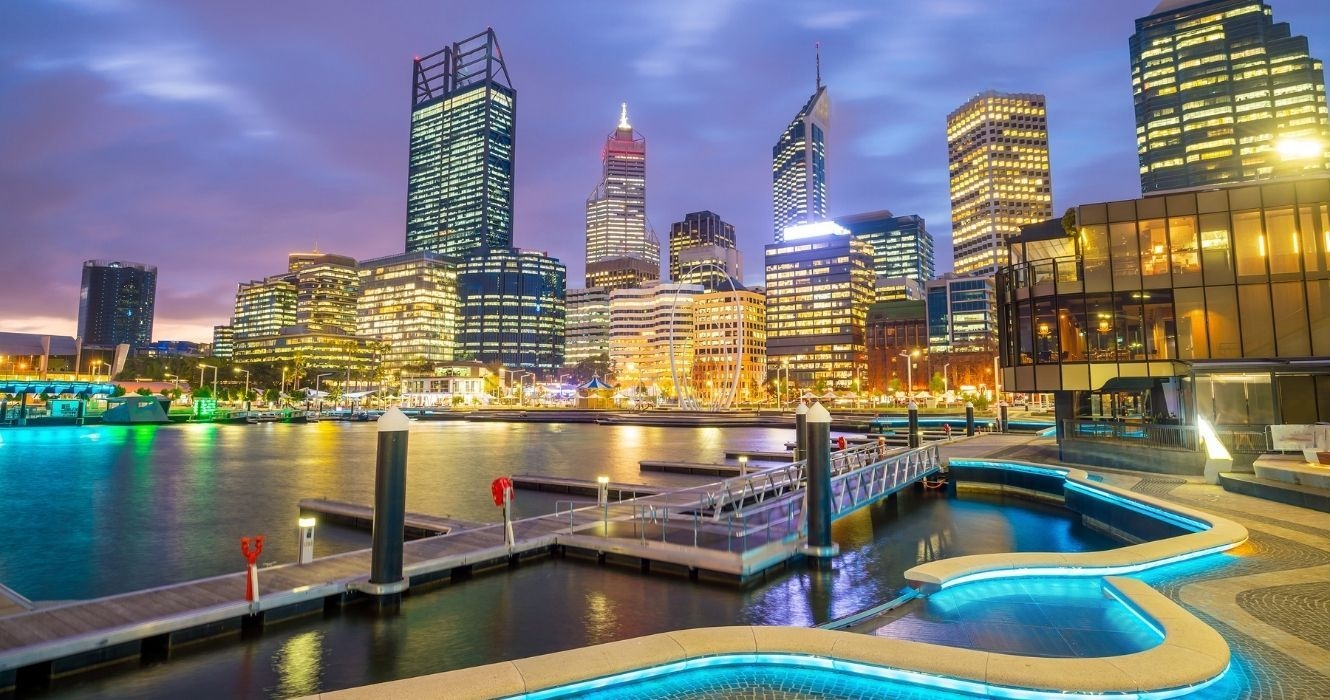 |
| Photo: TheTravel |
Take it from the tens of thousands of other international students who have made the journey down under and settled in the vibrant city of Perth. Student culture is huge in the area, so you’ll be able to meet a lot of new people in similar situations to yourself.
Although Perth is one of Australia’s major metropolises, studying here will give you a very relaxed, suburban feel. Some of the schools and universities are a little more spread out from Perth’s CBD (Central Business District) and many students enjoy living within walking distance of them. If you want to live in the heart of the city, there are many options to travel via the regularly maintained public transport systems.
While studying in this glorious city you will have access to a world-class education system. Australian education is highly regarded across the globe and the Government spends millions of dollars on providing scholarships for international students to study here.
Perth is the perfect place if you’re looking to settle and get started in an Australian career. The job industry in Perth is booming. It’s less competitive than other capital cities, like Sydney and Melbourne. Salaries are higher than in any other city in Australia, and it has a high rate of international students finding employers willing to sponsor them. The opportunity here is huge.
The working environment in Perth is similar to most cities across Australia with their laid back, relaxed approach to work. This will allow you to have a good work-life balance and the informal nature in the working environment will allow you to feel that you are being treated fairly and equally to other employees.
It is normal in Australia to have office drinks with your colleagues, helping to build good relationships. It is commonplace for bosses to come and join too.
There is currently massive potential in Perth for work in sectors such as healthcare, tourism and construction. It might be a good idea to begin here if you are looking for a pathway to stay in this beautiful country.
Perth has more of a suburban feel to it than other big cities because it is much more spaced out. As well as having your own safe suburbia to live in, you can also enjoy up to 320 days of sunshine a year, allowing you an active outdoors lifestyle and plenty of days at the beach. Perth is the idealistic Australia, which you will often catch glimpses of in travel guides. You will feel like your living in paradise with friendly neighbours and glorious, sophisticated views surrounding you.
Residents of Perth have one of the highest standards of living in the world. However, it is still affordable in comparison to other study abroad destinations.
8. Frankfurt, Germany
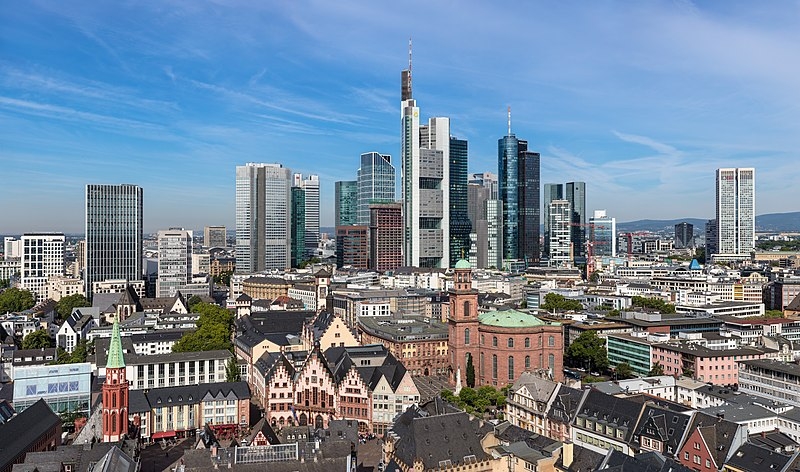 |
| Photo: Wikipedia |
Languages
Frankfurt residents officially speak German as their formal language, but they also use a dialect unique to the area – Frankfurterisch, which uses expressions and terms that those in other German cities will struggle to understand.
Conventional German will be fine, however, as will English is many areas – as Frankfurt is such a business hub most people will be multi-lingual, and the closer you are to the city center, the more likely you are to get by without understanding much more German than Guten Tag. As you drift towards the outskirts of the city, however, locals will respond considerably better to at least a token attempt to speaking their mother tongue.
Healthcare
Frankfurt is actually one of the most reputable cities in Germany in terms of healthcare, potentially because of the sizable number of high-powered citizens. Hospitals – both public and private – are plentiful and maintained to excellent standards, and are found to be generally more efficient than those found in other cities.
Healthcare expenses in Germany are covered by insurance, the cost of which will be split between yourself and your employer (though you will have to make a small payment for doctor’s appointments). As your employer will most likely offer you private health insurance as a perk, however – or at least a salary that makes this something that you can consider – such a policy is recommended. Frankfurt has a number of specialists in a variety of medical fields, and private insurance will help you bypass any waiting lists.
Climate
The weather in Frankfurt is a little more welcoming than some other German cities, with the winters less harsh than you may find in areas such as Berlin and very warm summers – the hottest in the country, in fact. As per many German cities, however, rainfall is frequent – even in the summer. You will not find many locals leaving their homes without an umbrella throughout the year for good reason.
Cost of living
Frankfurt is a little more expensive to live in than a city such as Berlin – housing, for example, could be closer to €1,700-1,800 (almost $2,000) per month in a desirable area. Of course, the average salary in Frankfurt is also higher than that in Berlin, so it’s swings and roundabouts – though do take into consideration that you will more than likely be working in a substantially sized and isolated corporate HQ with its own cafeteria. This means that meals will either be at subsidized prices, or used as an opportunity to hold you to ransom due to the lack of alternative options, depending on your luck! The cost of entertainment is largely comparable to other major cities (though theater entertainment is pleasantly surprising in how cost-effective it can be in Frankfurt).
9. Brisbane, Australia
The sunny capital of Queensland is packed with leisure, culture, nature, and great weather.
Finding schooling for international children in Brisbane is simple with Education Queensland international study programs from primary to high school.
Brisbane’s transportation includes taxis and Translink, which operates the bus service, the boats and catamarans to the outlying islands, and the Citytrain lines.
If you have a permanent visa, you have automatic access to Medicare, the government-sponsored healthcare system in Australia.
“The Sunshine State”
Living in Brisbane means opting for life in one of Australia’s tourist hotspots. Due to the hot, subtropical climate, Queensland is called the “Sunshine State”, and its capital city Brisbane does not prove an exception to this rule.
In Australia, Brisbane is often considered somewhat less sophisticated than Sydney, the leading metropolis, or Melbourne, the “cultural capital”. Its brash vitality, the casinos in the neighboring seaside resorts, and its live music scene have earned Brisbane the nickname of “BrisVegas”. However, you’ll soon discover that much of the prejudice jokingly uttered by Australians from other big cities like Melbourne or Sydney is — as so often — unfounded.
Leisure, Culture, and Nature
While living in Brisbane, you may like to pay a visit to the beachfronts of the “Gold Coast” or “Sunshine Coast” to enjoy the beautiful beaches. However, make sure to plan your schedule accordingly to avoid “Schoolies” events! There are three weeks, typically starting in mid-November, when thousands of high school graduates flock to the shores of the Gold Coast to participate in raucous parties. This annual event is equivalent to spring break celebrations in the USA. If you are planning to visit during this time, call your hotel before you book a room to make sure that you will not be in a party location.
Besides the long strips of sandy beaches, life in Brisbane has more leisure opportunities in store. Along the South Bank, the cultural precinct features the Queensland Museum, a large Performing Arts Centre, and the Gallery of Modern Art. Together with the Brisbane Powerhouse, the latter forms the core of a vibrant contemporary arts scene. And if indie rock — frequently featured at legendary venues like the Zoo — isn’t to your taste, the Brisbane Jazz Club has an excellent reputation as the go-to place for fans of smooth rhythms and cool tunes.
Expats living in Brisbane can also take advantage of its function as a gateway to Queensland’s natural beauty. The Scenic Rim in the hinterland more than deserves its status as a World Heritage Site. Its mountain ranges and lush rainforests make it an attractive destination for hikers and eco-tourists. Even if many expatriates often use their vacation for a trip home to see their loved ones, living in Brisbane brings you close to Hervey Bay: Reserve at least a few days off to explore Australia’s whale-watching capital and stepping stone to the South Great Barrier Reef.
10. Helsinki, Finland
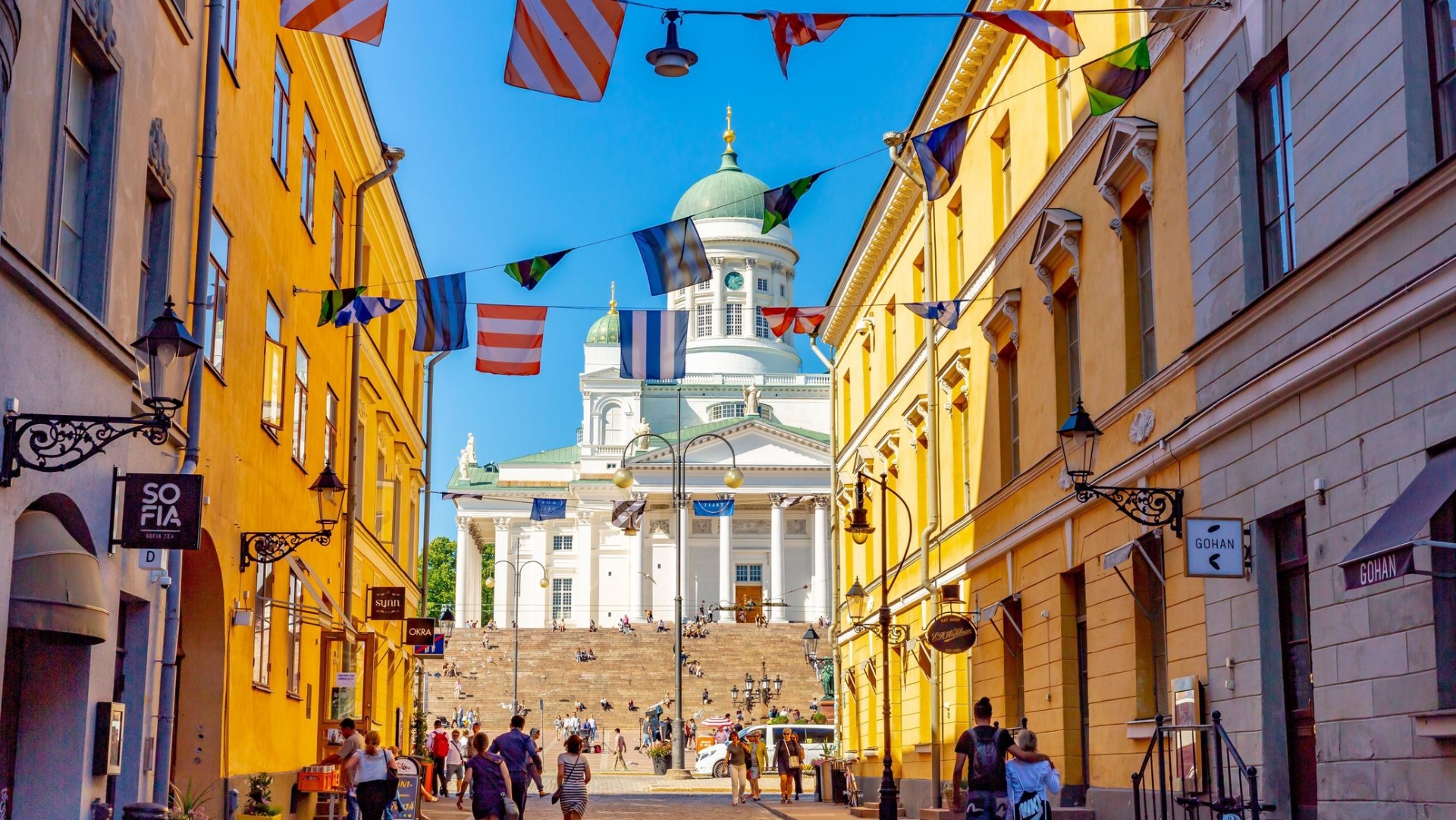 |
| Photo: planetofhotels |
The Finnish state education system is widely recognized to be one of the most successful in the world. People involved in educational reform in numerous countries refer to the Finnish system as a benchmark.
As such, teaching is a highly respected profession, on a par with doctors and lawyers. Schools are well funded and all are required to have a child welfare team to ensure that general wellbeing is prioritized as well as formal education.
In Finland, all children are entitled to free education from pre-school through to university. Helsinki boasts five universities and four polytechnics.
If you prefer your child not to learn through Finnish, which is a notoriously difficult language for foreigners, there are a number of alternatives. There are private schools teaching in English, Russian, German or French, including the Deutsche Schule Helsinki, the Ecole française Jules Verne, the Lyçee franco-finlandais and neighboring Espoo’s International Upper Secondary School.
Transportation in Helsinki
Helsinki is fortunate to have an efficient public transport network comprising buses, trams and the metro, all run by Helsingin Kaupungin Liikennelaitos (HKL).
You can purchase tickets on board, at stations or on your phone. Helsinki or metropolitan area residents can get a Travel Card, which can be loaded with season ticket or value for reduced rates in public transport.
Cycling is popular in Helsinki, partly due to the fact that it is a relatively flat city. The city operates a free bicycle hire scheme, and is committed to improving the cycling infrastructure.
Domestic flights operate from Helsinki Vantaa Airport to other parts of Finland, and there are direct international flights to over 30 countries from Helsinki. There are also ferry services taking passengers to Tallinn, Stockholm, Rostock, and St Petersburg.
The minimum age for driving in Finland is 18 years. Foreign nationals from many countries, including EU nations, are permitted to drive using the driver’s license from their home country.
Drivers should be aware that parking restrictions and regulations are rigorously enforced in Helsinki. It is a legal requirement to use headlights at all times of day and night in Finland. Roads in the capital can get congested at rush hour, something that needs to be factored in when planning a trip. From 1st December to 31st March, drivers are also required by law to have winter tires on their vehicle.
Culture and Leisure in Helsinki
There is plenty to see and do in your spare time while living in Helsinki, both in the city and its surrounding area. One of the most impressive places to visit is the vast fortress of Suomenlinna, built in the 18th century across six islands next to the harbor.
Originally designed to protect the area from the Russians, the fortress has been used for various military purposes over the years, and even today is home to the Finnish Naval Academy. During the 1970s, Suomenlinna was opened to the public and has become a popular visitor attraction.
If you enjoy going to plays or shows, there are plenty of events at theaters in Helsinki, including a variety of events in English. Dance and circus performances are also popular. Helsinki’s annual arts festival is held in August, and comprises art, dance, drama, movies, and a wide range of musical events.
Whether you love sport as a participant or a spectator (or both) there is a wide range on offer in Helsinki and the nearby area. Ice hockey and soccer are popular sports in Helsinki.
A visit to the Flamingo center makes a great day out for all ages, with its water park, spa, restaurants and other leisure activities. It is also adjacent to the vast Jumbo shopping center, and is located close to the airport in Vantaa.
Also in Vantaa is Heureka, the science center which has hands-on activities designed to educate children through exploration and play. Explanations and other information at Heureka are provided in Finnish, Swedish, and English.
 Top 10 Most Beautiful Married Couples in The World Top 10 Most Beautiful Married Couples in The World Not only do having a famous marriage in public opinion, but these star couples also make many people jealous because they are still happy and ... |
 Top 10+ Best Free Apps To Watch English Premier League and Links to Download Top 10+ Best Free Apps To Watch English Premier League and Links to Download The English Premier League, often known as the EPL, is one of the most-watched sports events in the world. Let’s first learn a bit about ... |
 Top 10 Most Handsome and Hottest UFC Fighters 2022/2023 Top 10 Most Handsome and Hottest UFC Fighters 2022/2023 Who are the hottest UFC fighters in 2022/2023? From Alonzo Menifield to Mauricio Rua, Charles Jourdain, and more, we offer picks for UFC fighters who ... |
 Full List and Top 10 Countries That Still Have The Death Penalty In The World Full List and Top 10 Countries That Still Have The Death Penalty In The World The death penalty has been banned in a lot of countries, but some still keep it. Let's find out which ones. |


























